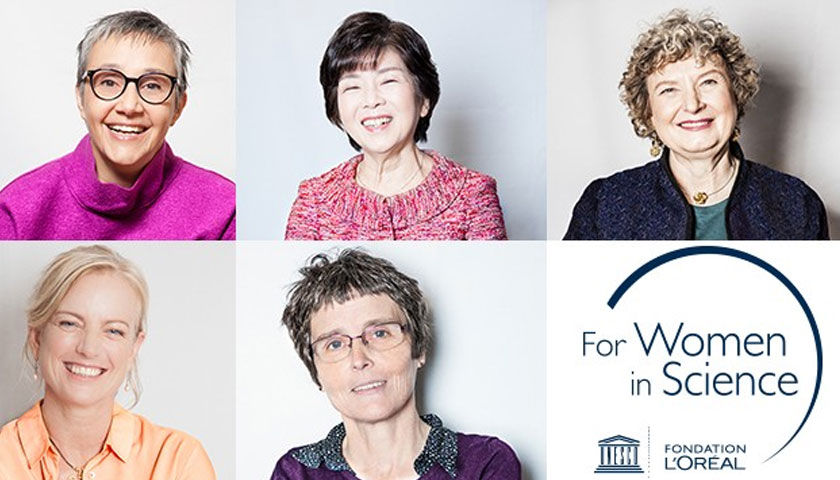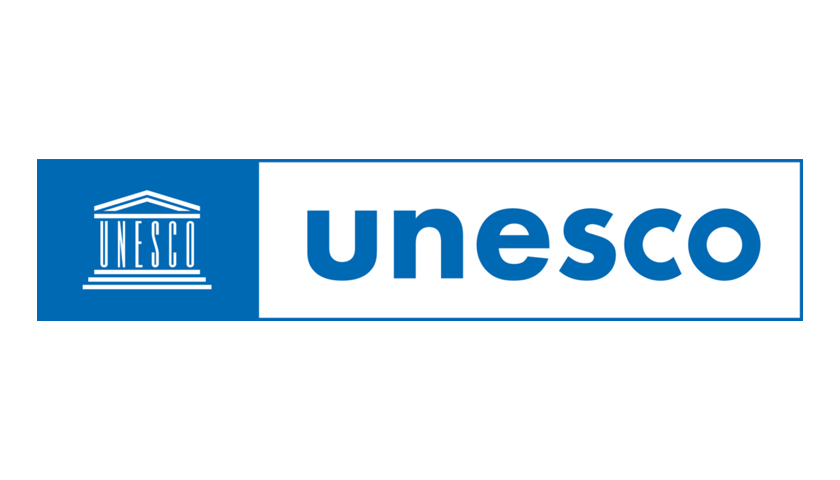On the occasion of the International Day of Women and Girls in Science celebrated on 11 February, the L’Oréal Foundation and UNESCO have announced the laureates of the 21st International Awards For Women in Science, which honours outstanding women scientists, from all over the world. These exceptional women are recognized for the excellence of their research in the fields of material science, mathematics and computer science.
Each laureate receive €100,000 and their achievements will be celebrated alongside those of 15 promising young women scientists from around the world at an awards ceremony on 14 March at UNESCO’s Headquarters in Paris.
Extending the award to mathematics and computer science
Mathematics is a prestigious discipline and a source of innovation in many domains, however, it is also one of the scientific fields with the lowest representation of women at the highest level. Since the establishment of the three most prestigious international prizes for the discipline (Fields, Wolf and Abel), only one woman mathematician has been recognized, out of a total of 141 laureates.[1]
The L’Oréal Foundation and UNESCO have therefore decided to reinforce their efforts to empower women in science by extending the International Awards dedicated to material science to two more research areas: mathematics and computer science.[2]
Two mathematicians now figure among the five laureates receiving the 2019 For Women in Science Awards: Claire Voisin, one of five women to have received a gold medal from the the French National Centre for Scientific Research (CNRS), and the first woman mathematician to enter the prestigious Collège de France, and Ingrid Daubechies of Duke University (USA), the first woman researcher to head the International Mathematical Union.
For women in science: more than 20 years of commitment
In the field of scientific research, the glass ceiling is still a reality: Women only account for 28% of researchers,[3] occupy just 11% of senior academic positions,[4] and number a mere 3% of Nobel Science Prizes.
Since 1998, the L’Oréal Foundation, in partnership with UNESCO, has worked to improve the representation of women in scientific careers, upholding the conviction that the world needs science, and science needs women.
In its first 20 years, the For Women in Science programme supported and raised the profiles of 102 laureates and more than 3,000 talented young scientists, both doctoral and post-doctoral candidates, providing them with research fellowships, allocated annually in 117 countries.
L’ORÉAL-UNESCO INTERNATIONAL AWARDS FOR WOMEN IN SCIENCE
THE FIVE 2019 LAUREATES
AFRICA AND THE ARAB STATES
Professor Najat Aoun SALIBA – Analytical and atmospheric chemistry
Professor of Chemistry and Director of the Nature Conservation Center at the American University of Beirut, Lebanon
Professor Saliba is rewarded for her pioneering work in identifying carcinogenic agents and other toxic air pollutants in the in Middle East, and in modern nicotine delivery systems, such as cigarettes and hookahs. Her innovative work in analytical and atmospheric chemistry will make it possible to address some of the most pressing environmental challenges and help advance public health policies and practices.
ASIA PACIFIC
Professeur Maki KAWAI – Chemistry / Catalysis
Director General, Institute of Molecular Sciences, Tokyo University, Japan, member of the Science Council of Japan
Professor Maki Kawai is recognized for her ground-breaking work in manipulating molecules at the atomic level, in order to transform materials and create innovative materials. Her exceptional research has contributed to establishing the foundations of nanotechnologies at the forefront of discoveries of new chemical and physical phenomena that stand to address critical environmental issues such as energy efficiency.
LATIN AMERICA
Professor Karen HALLBERG – Physics/ Condensed matter physics
Professor at the Balseiro Institute and Research Director at the Bariloche Atomic Centre, CNEA/CONICET, Argentina
Professor Karen Hallberg is rewarded for developing cutting-edge computational approaches that allow scientists to understand the physics of quantum matter. Her innovative and creative techniques represent a major contribution to understanding nanoscopic systems and new materials.
NORTH AMERICA
Professor Ingrid DAUBECHIES – Mathematics / Mathematical physics
Professor of Mathematics and Electrical and Computer Engineering, Duke University, United States
Professor Daubechies is recognized for her exceptional contribution to the numerical treatment of images and signal processing, providing standard and flexible algorithms for data compression. Her innovative research on wavelet theory has led to the development of treatment and image filtration methods used in technologies from medical imaging equipment to wireless communication.
EUROPE
Professor Claire VOISIN – Mathematics / Algebraic geometry
Professor at the Collège de France and former researcher at the French National Centre for Scientific Research (CNRS)
Professor Voisin is rewarded for her outstanding work in algebraic geometry. Her pioneering discoveries have allowed [mathematicians and scientists] to resolve fundamental questions on topology and Hodge structures of complex algebraic varieties.
L’ORÉAL-UNESCO INTERNATIONAL AWARDS FOR WOMEN IN SCIENCE
THE 15 INTERNATIONAL RISING TALENTS OF 2019
Among the 275 national and regional fellowship winners we support each year, the For Women in Science programme selects the 15 most promising researchers, all of whom will also be honoured on 14 March 2019.
AFRICA AND THE ARAB STATES
Dr. Saba AL HEIALY – Health sciences
L’Oréal-UNESCO regional fellowship Dubai, Mohammed Bin Rashid University for Medicine and Health Sciences
Dr. Zohra DHOUAFLI – Neuroscience/ Biochemistry
L’Oréal-UNESCO regional fellowship Tunisia, Center of Biotechnology of Borj-Cédria
Dr. Menattallah ELSERAFY – Molecular biology/Genetics
L’Oréal-UNESCO regional fellowship Egypt, Zewail City of Science and Technology
Dr. Priscilla Kolibea MANTE – Neurosciences
L’Oréal-UNESCO regional fellowship Ghana, Kwame Nkrumah University of Science and Technology
NORTH AMERICA
Dr. Jacquelyn CRAGG – Health sciences
L’Oréal-UNESCO regional fellowship Canada, University of British Columbia
LATIN AMERICA
Dr. Maria MOLINA – Chemistry/Molecular biology
L’Oréal-UNESCO regional fellowship Argentina, National University of Rio Cuarto
Dr. Ana Sofia VARELA – Chemistry/Electrocatalysis
L’Oréal-UNESCO regional fellowship Mexico, Institute of Chemistry, National Autonomous University of Mexico
ASIA PACIFIC
Dr. Sherry AW – Neuroscience
L’Oréal-UNESCO regional fellowship Singapore, Institute of Molecular and Cell Biology
Dr. Mika NOMOTO – Molecular biology / Plant pathology
L’Oréal-UNESCO regional fellowship Japan, University of Nagoya
Dr. Mary Jacquiline ROMERO – Quantum physics
L’Oréal-UNESCO regional fellowship Australia, University of Queensland
EUROPE
Dr. Laura ELO – Bioinformatics
L’Oréal-UNESCO regional fellowship Finland, University of Turku and Åbo Akademi University
Dr. Kirsten JENSEN – Material chemistry, structural analysis
L’Oréal-UNESCO regional fellowship Denmark, University of Copenhagen
Dr. Biola María JAVIERRE MARTÍNEZ – Genomics
L’Oréal-UNESCO regional fellowship Spain, Josep Carreras Leukaemia Research Institute
Dr. Urte NENISKYTE – Neuroscience
L’Oréal-UNESCO regional fellowship Lithuania, University of Vilnius
Dr. Nurcan TUNCBAG – Bioinformatics
L’Oréal-UNESCO regional fellowship Turkey, Middle East Technical University

